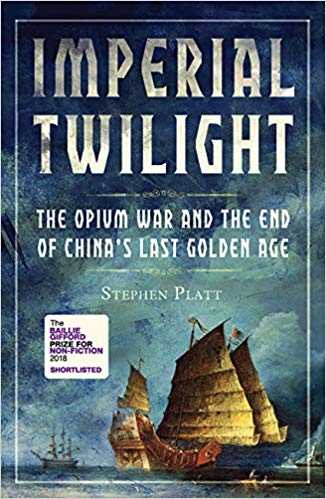Salaam
Like to share
Blurb
More people live in the western rim of the Pacific Ocean than anywhere else, but the region’s economy is off balance. Production is about to eclipse demand, and the trade war between Beijing and Washington will cast a shadow over Asia Pacific in 2019.
Related, book review Imperial Twilight.
Blurb
When Britain launched its first war on China in 1839, pushed into hostilities by profiteering drug merchants and free-trade interests, it sealed the fate of what had long been seen as the most prosperous and powerful empire in Asia, if not the world.
Corruption, popular unrest and dwindling finances had weakened China far more than was commonly understood, and the war would help set in motion the eventual fall of the Qing dynasty - which, in turn, would lead to the rise of nationalism and communism in the twentieth century. As one of the most potent turning points in the country's modern history, the Opium War has since come to stand for everything that today's China seeks to put behind it.
By telling this epic story, award-winning historian Stephen Platt sheds new light on the early attempts by British traders and missionaries to 'open' China and paints an enduring portrait of an immensely profitable - and mostly peaceful - meeting of civilizations, which was destined to be shattered by one of the most shockingly unjust wars in the annals of imperial history.
Brimming with a fascinating cast of British and Chinese characters, this riveting narrative of relations between China and the West has important implications for today's uncertain and ever-changing political climate.

Like to share
Blurb
More people live in the western rim of the Pacific Ocean than anywhere else, but the region’s economy is off balance. Production is about to eclipse demand, and the trade war between Beijing and Washington will cast a shadow over Asia Pacific in 2019.
Related, book review Imperial Twilight.
Blurb
When Britain launched its first war on China in 1839, pushed into hostilities by profiteering drug merchants and free-trade interests, it sealed the fate of what had long been seen as the most prosperous and powerful empire in Asia, if not the world.
Corruption, popular unrest and dwindling finances had weakened China far more than was commonly understood, and the war would help set in motion the eventual fall of the Qing dynasty - which, in turn, would lead to the rise of nationalism and communism in the twentieth century. As one of the most potent turning points in the country's modern history, the Opium War has since come to stand for everything that today's China seeks to put behind it.
By telling this epic story, award-winning historian Stephen Platt sheds new light on the early attempts by British traders and missionaries to 'open' China and paints an enduring portrait of an immensely profitable - and mostly peaceful - meeting of civilizations, which was destined to be shattered by one of the most shockingly unjust wars in the annals of imperial history.
Brimming with a fascinating cast of British and Chinese characters, this riveting narrative of relations between China and the West has important implications for today's uncertain and ever-changing political climate.

